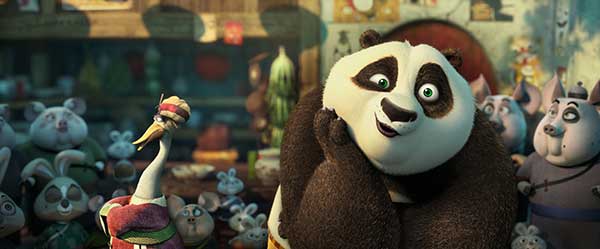 |
|
A scene from the latest film of the Kung Fu Panda franchise, which will premiere globally on Jan 29.[Photo provided to China Daily] |
In a special move to tailor the film for the Chinese market, DreamWorks crafted two versions of the films, one "normal" version, dubbed by local movie stars and artists, and another "tailored" version, where it is animated differently to more accurately adhere to the mouth movements and body language of Chinese. According to DreamWorks, the customized Mandarin version is not simply a dubbed version, but a redesign and rewrite of the script. Elements such as dialects and more localized puns were added specifically for Chinese audiences.
More than 200 Oriental DreamWorks employees have worked on the film in Shanghai, providing feedback on the authenticity of Chinese elements in the film and fine-tuning the details of the second version of the Mandarin-language script.
Jennifer Yuh Nelson, director of the film, said Chinese artists helped improve the authenticity of the film, as some of the cultural difference between the two nations only came to light after thorough discussions between the Chinese and American staff.
"We were trying to come up with fun things the characters do - what they eat, how they play. As Western story artists, one of the things we put in was cookies. And the Chinese story artists basically said, 'Ummmm. You can't put in cookies, you have to put in traditional food,'" said Nelson. This eventually led to a change in script.
Kung fu superstar Jackie Chan, who voices Master Monkey and Po's biological father in English and Mandarin and Cantonese, said it was an interesting and challenging experience to dub for two different roles in three editions of the film.
"My character would have a steamed bun in his mouth sometimes. So I put three fingers in my mouth while dubbing. Those details can help enliven the cartoon character. It's very cool," said the 61-year-old action star.
The final number, Try, written and performed by household name singer-songwriter Jay Chou and his protégé Patrick Brasca, is also a rare example where Chinese lyrics are featured in a Hollywood film. Furthermore, the media has praised the film for its comprehensive use of Chinese elements, which pervades the entire film, along with a family film script that can be appreciated regardless of age. Some have compared it with last year's dark horse at the box office, Monster Hunt, which set numerous highs in China's film history. It is definitely a film to look forward to.